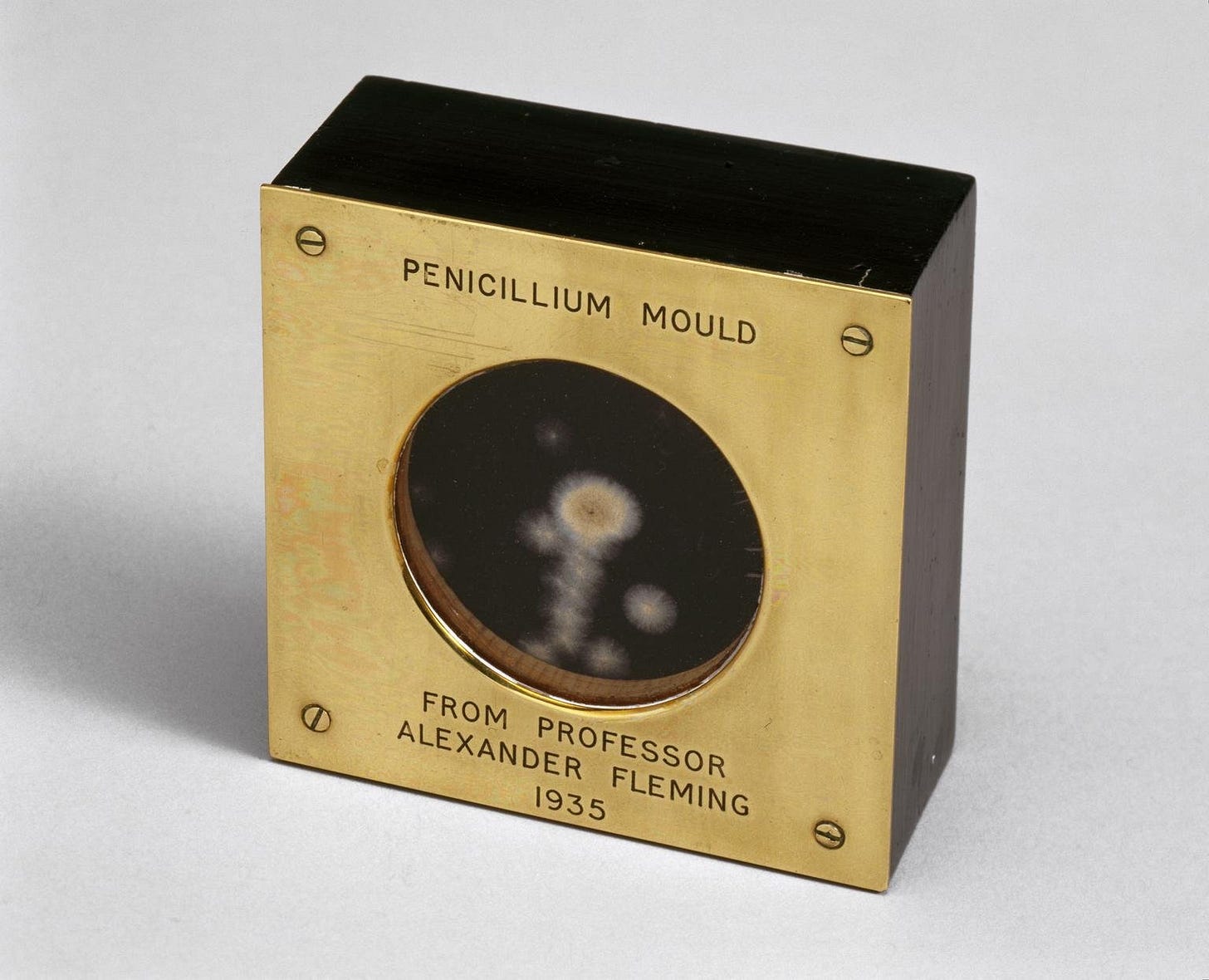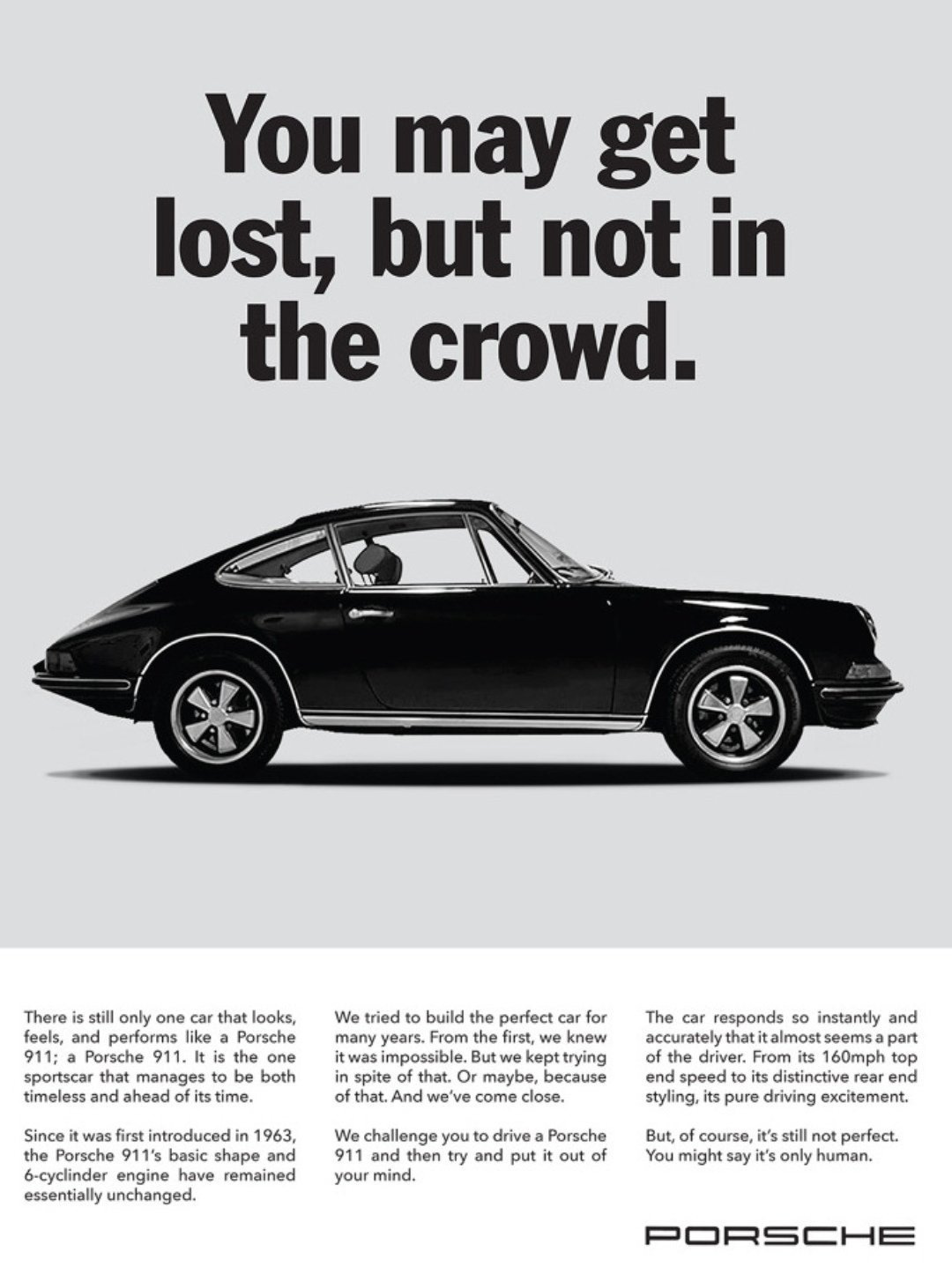Coming to you from: Faro Cafe, Harvard Square
Accidentally saving 100,000+ lives
Alexander Fleming, the father of antibiotics, was a beneficiary of chance. He did not intend to have a career in research and only came across immunology while he served as a private in the London Scottish Regiment of the Territorial Army. The captain persuaded him to stay on board as a researcher rather than a surgeon, which only set the stage for his next fortuitous event.
In 1928, he returned home from holiday and discovered that mold spores were growing in the uncovered petri dish next to an open window. The mold encapsulated and even killed colonies of the common staphylococcal bacteria he was experimenting with. Fleming isolated the mold and identified it as Penicillin. Over a decade later, two other scientists mass-produced it for use medicinal use during World War II, where it saved over 100,000 lives. Fleming received the Nobel Prize in Physiology and Medicine in 1945.
Right place, right time? Some argue he did not deserve the prize at all.
In reality, it wasn’t purely chance. His time as a researcher honed his ability to note the most minuscule abnormalities within the confines of a petri dish. Luck did win him the prize, but he created some of that luck for himself with expertise and a sharp eye.
Source: UK Science Museum
The four types of chance
In 2007, Marc Andreessen famously cited the four types of luck (naturally, venture capitalists are no strangers to luck; they just call it “due diligence”). Here is the breakdown:
Pure chance: Consider this to be the land where miracles (and calamities) hail from. Pandemics and natural disasters, despite their increasing ubiquity today, are pure chance. It is also blind to your preferences. For example, you did not choose where you were born or the circumstances you were born into, so your intrinsic traits are a result of a game of probability. The biggest misconception about chance is that all of it falls into this category.
Kinetic chance: When you move, you make waves. And when these waves crash, people notice. When Brian Chesky first brought his idea of Airbnb to Paul Graham of YCombinator (yes, staying on theme here with venture capital), Graham noted:
“During the batch, our nickname for Brian Chesky was The Tasmanian Devil, because like the cartoon character he seemed a tornado of energy. All three of them were like that. No one ever worked harder during YC than the Airbnbs did. When you talked to the Airbnbs, they took notes. If you suggested an idea to them in office hours, the next time you talked to them they'd not only have implemented it, but also implemented two new ideas they had in the process…They probably have the best attitude of any startup we've funded.”
Sometimes, all you have to do is make a little extra noise to increase your reach. This is your sign to let your mom brag about your accomplishments on her Facebook.
Discerned chance: This is the type of luck that only you can see from a mile away. You know which rooms to put yourself in based on where you think opportunity will strike. A great investor knows which investments to pick and when, a great entrepreneur knows which markets are going to boom, and a great college student knows which info sessions to attend to have the best chance at free lunch.
Deterministic chance: Let this oxymoron be a reminder that luck can be created. This is the type of chance that comes from you being good at being yourself. You have a craft you have mastered or are going to master, and that craft is going to bring others to you. It’s where luck becomes destiny because the world will face challenging problems and it will call on a cadre of erudite individuals for answers. Zero in on the few things you are excellent at and, one day, we can all have our own Nobel Prizes.
Luck surface area
The four types of luck framework should reveal one key insight: luck is not a fixed commodity.
In 6th grade, I did my science fair project on the chemical reaction rates’ correlation with reactant surface area. In reality, I simply found an intelligent-sounding way to phrase the fact that powdered aspirin tablets dissolved in water faster than a whole tablet did. Don’t take my advice on chemistry, though; I ended up in business school for a reason.
Years later, I am now realizing the parallel between that “experiment” and my observations today; increasing your surface area will increase your exposure to the right people and the right situations. You are likely to succeed quicker by increasing your luck surface area. Here are three ways you can do just that:
Put yourself out there: Meet more people, go to more places, and be vocal about your passions and interests. To get closer with people more quickly, talk to strangers as if you’ve always been friends with them. “Not so small talk” can help fast forward the pleasantries, and the result is a catalyzed relationship built on a leap of faith. Remember, fortune favors the bold, and it certainly favored Porsche in the 80s when they used their personality and brand to cut directly to the chase with their customers:
Leverage the network effect, not just networking: Humans are social creatures. They love to talk, and they are talking about you, too (don’t assume you’re the exception to gossip). Give them something good to talk about and they’ll build your reputation and name recognition for you. All it takes is one friend bragging to their colleague about your interests or goals. This is a lot more efficient and effortless than individually meeting each person in your network. The founder of AngelList doesn’t mince words on this topic:
“Trying to build business relationships well in advance of doing business is a complete waste of time... Be a maker who makes something interesting people want. Show your craft, practice your craft, and the right people will eventually find you.”
- Naval RavikantStay frosty: Luck can strike at any time - stay ready and collected for when it comes. This can mean something as simple as paying attention to when people talk about their interests or events. Life happens around you, and this is how you can participate.
If you recently started a new chapter of your life, you have the perfect chance to sandbox these methods. It can help you reorient yourself in a sea of change and set yourself up for success, whether that’s meeting new people or accomplishing new goals. There’s solace in the idea that luck is not static and we don’t have to chalk everything up to pure chance.



love the use of the word cadre in here..
Such a good read! Thank you for sharing.